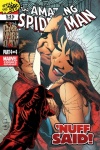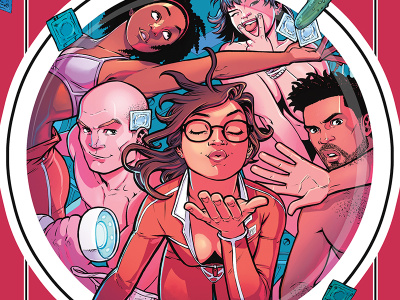
Sharpening the Sword is a regular column by retailer John Riley of Grasshopper's Comics, a 1300 square foot comic and games store in
So there I was sitting in the theater watching the ending of Spider-Man 3. It was one of the few moments in life when I have been genuinely embarrassed to be a comic book fan. It was supposed to be the dramatic conclusion. There was Peter talking to a dying Harry, the drama was thick, and the audience was laughing uncontrollably while I slouched down in my seat and groaned. I had a similar reaction to the end of the recent Spider-Man storyline 'One More Day' (OMD). I try to refrain from discussing editorial content here, but since we've tied our professional cart to this horse, I think it's important to look at all the signals this story is sending, and the implications it has on us as retailers.
I could go on for pages regarding editorial problems with this story, but here's a few highlights. First of all, when they announced OMD, our customers jokingly speculated, 'Let me guess. He makes a deal with Mephisto!' So when the best story you can come up with is what we're all joking about in the store, it's a bad sign. And the story itself just makes very little sense. For example, Marvel policy is that no good characters will be seen smoking, yet apparently it's OK for them to make a deal with the devil?
As a parent, the fact that Peter and MJ completely fail to take Aunt May's wishes into consideration (what parent wouldn't sacrifice their own life for their children's happiness?) seems to contradict the entire point to the story. If they really cared about her, they'd respect her wishes. Of course, this centers around the fact that they've taken their 'everyman' character and turned him into someone that nobody can relate with or would want to.
OK, so it's pretty obvious I hated the story.
But what offended me, and my customers the most, were the signals that this story sent from editorial. As we discussed a few weeks ago, our customer base is continually aging and with J. Michael Straczynski's (JMS) direction for the last six years, Spider-Man has aged a bit too, enabling us to continue to relate to him. You'd think that having your audience relate to your character would be a positive thing. Instead, the story has been brought back to a point in Spidey's life that most of us have absolutely no desire in reliving.
Oh, and we've erased about 36 years of continuity in the process.
So why should we care? Well, for a few reasons really.
The first is that OMD is just the latest in a long series of retroactive changes that have swept through comics in the past few years. When Fantastic Four first emerged on the scene it ushered in the age of the long linear narrative, the long soap opera story that got so many of us hooked from the sixties through the eighties. I'll admit that as time went on that continuity can sometimes become burdensome, but the new trend seems to be to either destroy previous continuity or to immediately nullify a story almost as soon as it's done. This is actually best seen with Spider-Man, where in just the past few years we've had Marvel write their way out of Sins Past, The Other, and his unmasking in Civil War almost as soon as these stories were over. For all the build-up, hype and promotion of The Other, within 60 days of the story's conclusion, Marvel officially decided it never happened.
All of this points to an editorial team that apparently has no long-term plans (I believe JMS had long term plans for the character, but that's another column entitled 'How Mega-Crossovers Destroy All Creativity.') But more importantly, it conditions our readers not to care. After all, why should we care about a current or upcoming story when every story seems to be negated almost as soon as it's done?
The current belief among fans is that no story is real, no story is permanent, and as a result the dramatic impact of almost every story is lost, the same dramatic impact that keeps readers hooked and coming back into our stores week after week. I know that 'nothing is permanent' in comics, but the current trend is not simply to bring a character back from the dead, but to totally wipe from existence years of stories that we may have enjoyed. Captain
OMD shows a total disregard for the fans' desires, and arrogance on the EIC's part when he continues to claim that 'this is what fans demanded.' In the past week we've had a number of customers cancel all their Spider-Man titles, and a large percentage of them cancelled all their Marvel titles across the board. Regardless of the fact that Thor is currently a great series, their attitude is, 'Why should I bother when I'm sure this story won't matter in a few months either.'
For retailers this situation presents quite a few problems besides the obvious initial backlash. We're now left with shelves of trade paperbacks of stories that never took place. 'This is a great story...although it never existed...but you should still buy all nine volumes,' just isn't a great sales pitch. And how do we explain the Civil War trade paperbacks to customers who have heard about it and are interested in entering comics through that story? 'Well, in order to understand the full story you really need to read both the main Civil War and the Civil War Amazing Spider-Man trade. Although the Spider-Man story never really happened, so don't let that confuse you.'
This week our industry got a major piece of media coverage in a one-page story in Newsweek. But it wasn't focused on Spider-Man. Instead it was focused on Wonder Woman and the fact that for the first time in her history it would now be written full-time by a female writer, Gail Simone. The article went on to describe the Wonder Woman title as '...fantasy based storyline and action-heavy, cleavage-filled plots,' and how the comic audience is primarily overwhelmingly male. The article goes on to compare graphic novels created by women like
Sounds like the same old uneducated criticism of our medium, right? Well the scary part is the statement that 'The diverse subject matter of alternative comics such as manga and graphic novels...may partially account for their appeal. Kelso, the author of The Squirrel Mother, says that the availability of alternative comics in bookstores, as opposed to obscure specialty comics stores, may be another reason.' There you have it; we are the enemy keeping the medium down, while those family-friendly bookstores provide 'real comics literature' to the masses. And unfortunately, the type of publicity that OMD has gained for our industry feeds right into this type of thinking.
Ultimately, we have our work cut out for us. Marvel has decided the course of action that it will pursue, caring mostly about its new movie business, and continuing to alienate their own comic readership with pointless mega-crossovers and retconn after retconn. But as retailers we have the ability to decide what face we want to present not only to fans but to the general public who still has to learn about the beauty of our medium; people who've never heard of Watchmen, Y The Last Man, 300 or Maus or Pride of Baghdad, Walking Dead, or Invincible. I know what face I'll choose to put forward. What will yours be?
The opinions expressed in this Talk Back article are solely those of the writer, and do not necessarily reflect the views of the editorial staff of ICv2.com.







